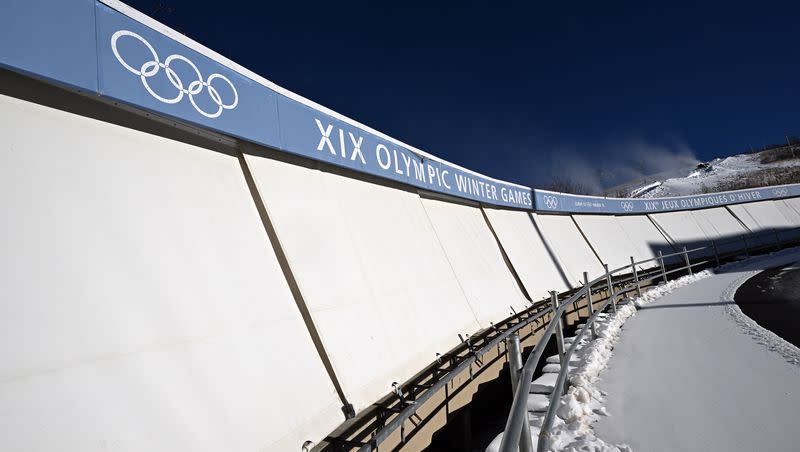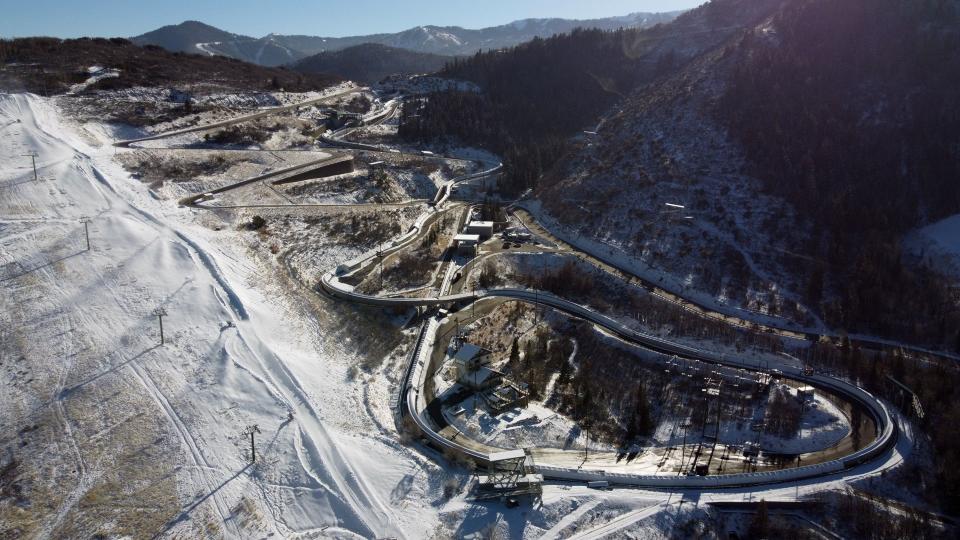A big decision is coming about Utah’s bid to host another Olympics. Here’s what you need to know

There’s big news coming this week for Utah’s bid to host another Olympics.
International Olympic Committee leaders are expected to narrow the field in the race to host the 2030 and 2034 Winter Games during three days of meetings in Paris that begin Wednesday.
The Salt Lake City-Utah Committee for the Games is already planning a celebration Friday evening, featuring the re-lighting of the Olympic Cauldron from the 2002 Winter Games at the University of Utah’s Rice-Eccles Stadium.
“I’ve got a big smile on my face,” Fraser Bullock, the bid committee’s president and CEO, told the Deseret News, anticipating that Salt Lake City will soon be closer than ever to hosting a second Winter Games after more than a decade of trying.
Here’s what Utahns need to know:
Who’s bidding to host the 2030 and 2034 Winter Games?
Salt Lake City is bidding to host in either 2030 or 2034, with a preference for the later date to avoid competing for domestic sponsors with the 2028 Summer Games being held in Los Angeles.
Three countries — Sweden, Switzerland and France — are still putting together late entries in the race for 2030 after the IOC delayed making a decision a year ago and opened the door to new bids.
During an October IOC meeting, Salt Lake City was the only bid identified as in the running for 2034, and there was no mention of the previous 2030 contenders that struggled with support, Sapporo, Japan; and Vancouver, Canada.
How are the hosts for the 2030 and 2034 Winter Games being chosen?
The Switzerland-based IOC is using a new, less formal process to select the sites for the 2030 and 2034 Olympics. At the October meeting, the IOC agreed both Winter Games could be awarded at the same time.
Although the IOC used to award an Olympics seven years in advance, there are no timelines or deadlines spelled out in the new bid process, which starts with informal talks with potential hosts that can remain private.
Those talks can lead to what’s referred to as continuous dialogue, where any number of “interested parties” engage in ongoing but noncommittal discussions that include a technical review and presentations to the IOC’s Future Host Commission.
Related
Salt Lake City has been an “interested party” since November 2020. Last week, Utah’s bid team, including Utah Gov. Spencer Cox and Salt Lake City Mayor Erin Mendenhall, made their most recent virtual pitch to the Future Host Commission.
The commission makes recommendations to Bach and the rest of the IOC Executive Board, who’ll decide which bids advance to the next stage of the bid process, known as targeted dialogue.
There, “interested parties” become “preferred hosts” for a specific Olympics and begin negotiating the details of hosting, including the contract that must be signed when the bid is finally awarded.
The IOC Executive Board is scheduled to hear from the Future Host Commission on Wednesday. Despite last year’s delay, Bullock said there isn’t any reason to believe there won’t be a decision about targeted dialogue.
He and other bid supporters will be at a “watch party” Wednesday on the steps of the Salt Lake City-County Building to view an IOC news conference set to be livestreamed at 11 a.m. for any announcement about 2030 and 2034.

What happens next if Salt Lake City is advanced to targeted dialogue?
“Once a city enters targeted dialogue — and, of course, this is new — I believe the odds of a Games award is extremely high,” Bullock said. Utah’s bid team has already completed mountains of paperwork required under targeted dialogue.
“Basically, we’re ready to submit that,” he said, adding that in addition to negotiating the host contract during targeted dialogue, the IOC “will validate our plans. They will help us refine our thinking in areas where that needs to be adjusted.”
There is no limit on how many bids can be advanced to targeted dialogue, so conceivably all three European bids could move to the next stage of the bid process for 2030 and Salt Lake City for 2034.
While it is possible the European bids could falter, leaving Salt Lake City as the only remaining choice for 2030, that’s now considered unlikely since the bids from Sweden, Switzerland and France are all seen as coming together.
One Olympics expert, GamesBids.com producer Robert Livingstone, wrote this week that Utah being the only bid advanced for 2034 “is as close to certain as any expected IOC decision ever” and said readers should “bet the house on Salt Lake City.”
When will there be a final decision from the IOC?
Again, there’s no deadline, but the award is made by the full IOC membership that meets annually. The next scheduled IOC session is in Paris, just before the start of the 2024 Summer Games, on July 23 and 24.
That could mean the final vote is held on a major Utah holiday, Pioneer Day on July 24.
“Anything’s possible,” Bullock said. “That would be a special day for Utah.”
Who’s behind Utah’s bid?
While Bullock is leading the bid, a four-time Olympic speedskater, Catherine Raney Norman, is the chair of the bid committee. Members include state and local political, business and community leaders as well as other Olympians and Paralympians.
Related
The expected $2.5 million bid cost is being paid for entirely by private donors, Bullock said. The committee was formed after the U.S. Olympic and Paralympic Committee selected Salt Lake City over Denver five years ago to bid for a future Winter Games.
The bid effort started under former Gov. Gary Herbert in 2012, with an eye toward hosting the 2022 Winter Games that eventually went to Beijing. The 2026 Winter Games are being held in Milan-Cortina, Italy.
How much would another Olympics in Utah cost? And who would pay for it?
Hosting the 2030 Winter Games carries a $2.2 billion price tag, but waiting another four years would add to that total because of inflation and the expense of running an organizing committee for an extra four years, Bullock said.
“We’re still refining elements of our budget because now that we’re at 2034, there’s some uncertainties that we have good estimates for, but we need to work through,” he said of the adjustments that need to be made.
Just like with the bid, Bullock said the Games budget would come entirely from private sources, primarily from the sale of sponsorships, broadcast rights and tickets. Not included in the budget are the federal funds that would be provided for security.
The Utah Legislature is spending tax dollars on Olympic venues, including the sliding track and ski jumps at the Utah Olympic Park near Park City, an amount that’s expected to exceed $140 million.
But Bullock said that’s because everyday Utahns are the “primary” users for the facilities, which also include the speedskating track at the Utah Olympic Oval in Kearns, not the elite athletes that come from around the world to train and compete at them.
Where would Olympic events be held in Utah?
Utah’s bid calls for using the same venues from the 2002 Winter Games, including U. housing for the athletes village and Rice-Eccles Stadium for opening and closing ceremonies as well as the Park City, Deer Valley and Snowbasin ski resorts.
But with 40% more events added to the Winter Games since 2002, Bullock said more venues are needed. Those are expected to be located at the Mayflower ski area under construction in Wasatch County as well as some downtown locations.
Should Salt Lake City succeed in attracting a Major League Baseball team to the state, the new stadium planned for the Rocky Mountain Power District could be used for nightly medal award ceremonies.
Big air competitions could also be held there or somewhere else in the city, Bullock said,
“We have some additional things that we can consider,” he said, adding that holding the dramatic ski event downtown would be a fun way to engage people. “If we’re selected for 2034, we’ve got lots of time to plan something spectacular.”
How would another Olympics in Utah be different than the 2002 Winter Games?
Bullock, the chief operating officer of the 2002 Winter Games, says hosting another Olympics and Paralympics that follow wouldn’t be the same in a state that has the nation’s youngest population.
Related
“The most important thing that’s new is the rising generation of kids that have never experienced the Games. For them, 2002 is just a mentioned memory but this will be a live experience,” he said.
And while there would be new events showcased that are “incomprehensible in terms of what these athletes do and the risks they take,” Bullock said the world can expect the same welcome extended more than two decades ago.
What Utah “showed to the world in ’02 was the fantastic community we have here, the great volunteers, the great spirit around the Olympics and Paralympics here,” he said, something that “resonates perfectly with the Olympic and Paralympic movements.”
Doing that again is an opportunity “to remind the world once again what the people of Utah are like. In my opinion, the world could use more of the spirit of welcoming and volunteerism that we see here every day.”

